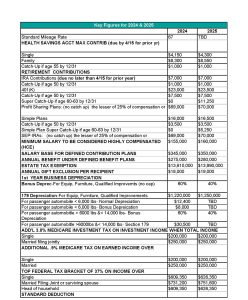Q: What’s better than a Memorial Day sale?
A: A day at the beach? The first great BBQ of the summer? A discount on your 2022 California business income taxes?
Q: Wait a minute! Is California really having a sale on business income taxes? Can I really get a discount?
A: No, not technically. But California is doing the next best thing. Owners of S-corporations and partnerships with California taxable income can now get a federal deduction for 9.3% of their share of California business income. In most cases, the federal deduction is worth about 30%. (It’s OK if you want to think of this as a discount on your California taxes. It’s all cash in your pocket. We won’t tell.)
Q: Now you’re just confusing me. Want to start again?
A: Sure. Let’s go back to 2017. Congress passed the Tax Cuts and Jobs Act. This tax reform act was quite favorable to businesses, but there were a few gotchas. Arguably the biggest was the limitation on deducting state and local taxes, the SALT limit. It was set at $10,000. Since many business owners exceed that amount in real and personal property taxes, the SALT limit effectively made state income taxes nondeductible.
Obviously, business owners in high tax states weren’t pleased. Neither were state legislators. A few states proposed assessing business taxes at the entity level as a way of “working around” the $10,000 SALT limit. Shockingly in November 2020 with Notice 2020-75 the IRS agreed that taxes paid at the entity level reduce an owner’s share of federal taxable income and as a result are effectively fully deductible by the individual. This is true despite the fact that both the business and its owners must elect to pay the tax at the business entity level.
California was a little late to the party, but the governor signed AB150 on July 16, 2021. This was later amended by SB113 signed on February 9, 2022. Together these bills are known as the California Passthrough Entity Elective Tax, sometimes confusingly referred to as PEET, PTET, or PTT.
Q: Alright, everyone likes a federal tax deduction. How does this work? How do I get a deduction?
A: Your passthrough business entity (an S-corporation, partnership, or multi-member LLC) makes an election on its California business tax return. For each owner who also elects, a PEET (Passthrough Entity Elective Tax) is assessed on the entity at 9.3% of each electing owner’s share of income. The amount assessed for each owner on the 2021 business entity’s return becomes a credit on that owner’s 2021 California individual income tax return. The total amount assessed also reduces the entity’s federal income in the year the PEET is actually paid to California. This is the entire point of the workaround. It also raises the first complication. Who gets the federal deduction?
Q: Don’t the owners get the same California credit and federal deduction?
A: We love the way you’re thinking. That seems fair to us. If all owners elect and if all owners are California residents, then that is exactly the answer you get. When you have nonelecting or a mix of resident and nonresident owners, the entity will need to make balancing distributions to nonelecting owners and the federal deduction will be allocated in the same manner as other income and expenses. So yes, a nonelecting or nonresident owner may benefit from the elections of other owners. This is always true with an S-corporation. On the other hand, partnerships may be able to make special allocations if certain technical requirements are met.
Q: I’m with you so far. That federal deduction is awfully tempting. What do I need to do now for 2022?
A: Your business entity must make a qualifying payment by June 15th.
Q: How much is the payment?
A: First we will tell you the minimum payment that your business entity needs to make to California, then we’ll tell you why it should pay more. (We promise we’re not crazy. Just give us a paragraph or two.)
If your business entity did not elect to pay the PEET for 2021, then only a $1,000 payment is required to keep your options open for 2022.
If your business entity did elect to pay the PEET for 2021, then the required payment is 50% of the PEET shown on the 2021 business entity return. This is true even if the return won’t be filed until September! There is no grace. Miss it by a single dollar and your entity is precluded from making the election for 2022. Please note that this test is at the entity level. If one owner who elected in 2021 doesn’t elect in 2022, the required minimum payment by the entity doesn’t change. This test is also based on the prior year PEET, not the current year income or current year PEET. If 2021 was an unusually profitable year, it might not make sense to elect for 2022.
Q: I’m still waiting. Why might I want to pay more?
A: We recommend that you pay the greater of 70% of your expected 2022 PEET or the minimum amounts described above by June 15th. If you don’t, you will need to include any excess 2022 PEET in your individual estimated tax payments in June. But your business entity will still need to pay it (again) in December or March. (A December payment gets you a 2022 federal deduction. A March payment will be deducted in 2023.)
Q: You said that the tax is assessed at the rate of 9.3%. My California tax bracket is higher or lower than 9.3%. May my entity use my actual tax bracket?
A: Unfortunately, no. If you owe more, you still need to make estimates. If you owe less, the excess credit can be carried over for five years. If your California tax bracket is less than 9.3%, you might not want to elect every year.
Q: Didn’t you say that this SALT limit began in 2018? What about 2018, 2019, and 2020?
A: California did not attempt to create a retroactive workaround. So far only Colorado has passed one. I’m sure that many in Sacramento are watching closely.
Q: You mentioned partnerships and S-corporations. I am a sole proprietor and have a single member LLC. I file a schedule C. Do I qualify?
A: Unfortunately, SMLLCs and Schedule Cs don’t qualify. A business interest owned through a SMLLC qualifies, but a SMLLC may not be the operating business entity.
Q: Am I too late for 2021?
A: Perhaps not. If your business entity’s return was extended, you have until September 15th to make an election on an original or superseding return. Unfortunately, failure to pay penalties will apply and will reduce the benefit of making the election.
Q: I’m sure you’re over 1,000 words and I’m afraid to ask, but any more complications?
A: Not only is this a new law, it’s a whole new concept for the California legislature and the FTB. As you would expect, it isn’t fully fleshed out. Simple things like what you can do with an overpayment seem overly restrictive at this time. As always, we’ll keep you posted as the law evolves and we receive more guidance.
Q: OK. My head is spinning but I want to get my federal deduction and I have additional questions. What should I do?
A: Contact your LSL partner or tax manager as soon as possible. Remember, this “sale” ends June 15th. And, of course, enjoy your BBQ this weekend!






